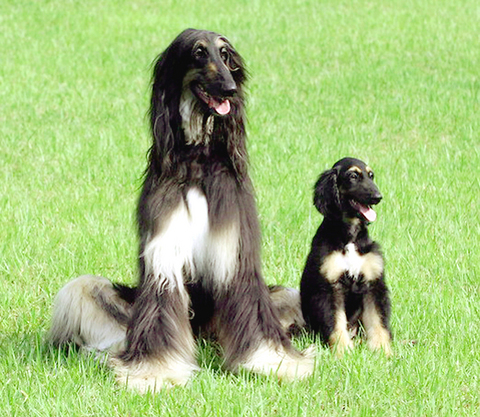The world's first cloning of a dog has raised concerns that scientists are one step closer to replicating human embryos, despite the breakthrough pointing to treatments for currently incurable human diseases.
A group of scientists from Seoul National University last week unveiled their creation, a black and white Afghan hound named Snuppy that is genetically identical to its three-year-old "father."
But while geneticists hailed the breakthrough as a step towards beating human diseases, others called for a worldwide ban on human cloning, saying that the pup had brought the human eventuality nearer.

PHOTO: AFP
The achievement of the team led by Professor Hwang Woo-suk is considered so significant because many canine diseases such as diabetes, cancer, dementia and problems in heart muscles, hips and joints are similar to those in humans.
Professor Kong Il-keun, a cloning expert at Suncheon National University, said cloning dogs had immense clinical value because canines have 203 genes that can be used for studying human diseases while the pig has only 65.
King Chow, assistant professor of biotechnology at the Hong Kong University of Science and Technology welcomed the latest advance, but warned that the scientific community needed to be on guard against possible human cloning.
"The development of the technology is a good thing in itself but how we monitor it and who we allow to use it will be of great importance," he said.
"If it has been done to help research and understanding of how humans developed from a single cell -- an area in which there are huge holes in our understanding -- then this is a very important development.
"But if it is to be taken further and applied simply to make multiple clones -- then I have strong objections."
In order to create Snuppy -- short for Seoul National University Puppy -- the team had to create 1,095 canine embryos that were transferred into 123 surrogate bitches resulting in three successful pregnancies.
One foetus miscarried but two others were delivered, including Snuppy on April 24. The other cloned dog died after 22 days from pneumonia.
Gerald Schatten of the University of Pittsburgh School of Medicine, Hwang's research planning and technology advisor, said the poor success rate justified a ban on human cloning.
"Because this again shows that reproductive cloning is unsafe and inefficient, we call for a worldwide ban on human reproductive cloning, which is also unethical," said Schatten,
Since scientists first cloned a sheep named Dolly in 1997, researchers have gone on to clone mice, cats, goats, pigs, mules, horses and deer.
But of all mammals, the cloning of dogs is technically the most challenging because of the difficulty of acquiring mature eggs.
Some experts say the cloning of a dog demonstrates that most of key techniques needed to clone humans are now available.
"Bring me human eggs, the necessary social consensus and legal permission and I can get you your replica within a year," said Park Se-pill, a senior researcher of Maria Biotech and a top cloning expert.
"In contrast to widespread public belief, cloning a human is much easier than cloning a cow or a pig," Park said.

It’s a good thing that 2025 is over. Yes, I fully expect we will look back on the year with nostalgia, once we have experienced this year and 2027. Traditionally at New Years much discourse is devoted to discussing what happened the previous year. Let’s have a look at what didn’t happen. Many bad things did not happen. The People’s Republic of China (PRC) did not attack Taiwan. We didn’t have a massive, destructive earthquake or drought. We didn’t have a major human pandemic. No widespread unemployment or other destructive social events. Nothing serious was done about Taiwan’s swelling birth rate catastrophe.

Words of the Year are not just interesting, they are telling. They are language and attitude barometers that measure what a country sees as important. The trending vocabulary around AI last year reveals a stark divergence in what each society notices and responds to the technological shift. For the Anglosphere it’s fatigue. For China it’s ambition. For Taiwan, it’s pragmatic vigilance. In Taiwan’s annual “representative character” vote, “recall” (罷) took the top spot with over 15,000 votes, followed closely by “scam” (詐). While “recall” speaks to the island’s partisan deadlock — a year defined by legislative recall campaigns and a public exhausted

In the 2010s, the Communist Party of China (CCP) began cracking down on Christian churches. Media reports said at the time that various versions of Protestant Christianity were likely the fastest growing religions in the People’s Republic of China (PRC). The crackdown was part of a campaign that in turn was part of a larger movement to bring religion under party control. For the Protestant churches, “the government’s aim has been to force all churches into the state-controlled organization,” according to a 2023 article in Christianity Today. That piece was centered on Wang Yi (王怡), the fiery, charismatic pastor of the

Hsu Pu-liao (許不了) never lived to see the premiere of his most successful film, The Clown and the Swan (小丑與天鵝, 1985). The movie, which starred Hsu, the “Taiwanese Charlie Chaplin,” outgrossed Jackie Chan’s Heart of Dragon (龍的心), earning NT$9.2 million at the local box office. Forty years after its premiere, the film has become the Taiwan Film and Audiovisual Institute’s (TFAI) 100th restoration. “It is the only one of Hsu’s films whose original negative survived,” says director Kevin Chu (朱延平), one of Taiwan’s most commercially successful